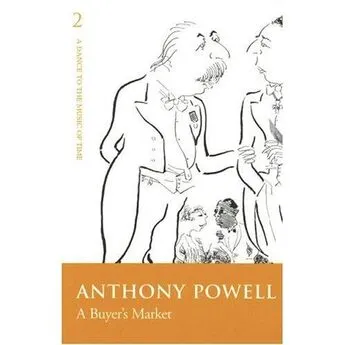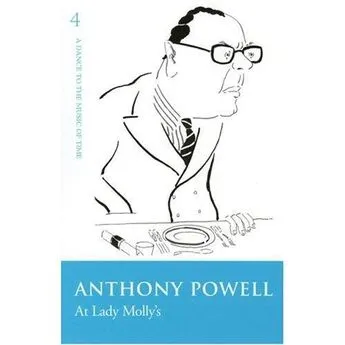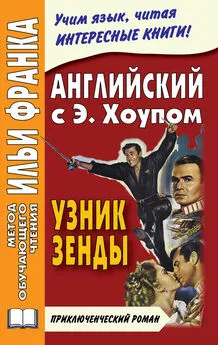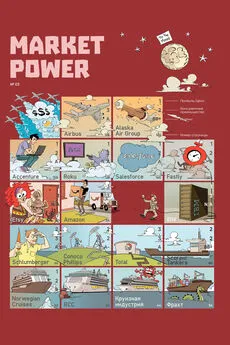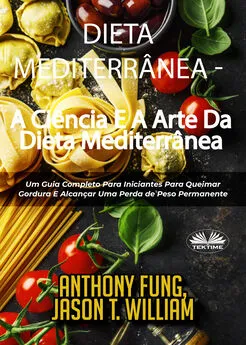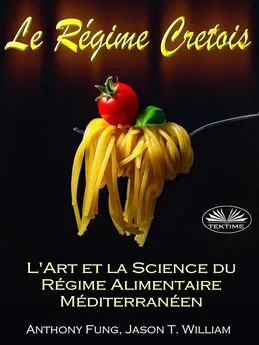Anthony Powell - A Buyers Market
- Название:A Buyers Market
- Автор:
- Жанр:
- Издательство:Arrow
- Год:2005
- ISBN:нет данных
- Рейтинг:
- Избранное:Добавить в избранное
-
Отзывы:
-
Ваша оценка:
Anthony Powell - A Buyers Market краткое содержание
Anthony Powell's universally acclaimed epic A Dance to the Music of Time offers a matchless panorama of twentieth-century London. Now, for the first time in decades, readers in the United States can read the books of Dance as they were originally published-as twelve individual novels-but with a twenty-first-century twist: they're available only as e-books. The second volume, A Buyer's Market (1952), finds young Nick Jenkins struggling to establish himself in London. Amid the fever of the 1920s, he attends formal dinners and wild parties; makes his first tentative forays into the worlds of art, culture, and bohemian life; and suffers his first disappointments in love. Old friends come and go, but the paths they once shared are rapidly diverging: Stringham is settling into a life of debauchery and drink, Templer is plunging into the world of business, and Widmerpool, though still a figure of out-of-place grotesquerie, remains unbowed, confident in his own importance and eventual success. A Buyer's Market is a striking portrait of the pleasures and anxieties of early adulthood, set against a backdrop of London life and culture at one of its most effervescent moments.
A Buyers Market - читать онлайн бесплатно полную версию (весь текст целиком)
Интервал:
Закладка:
“You can’t very well have him sitting at his desk,” said Sir Gavin, bluffly, “though I expect that was where he spent a good deal of his time. When I saw him in Paris at the time of the Conference—”
“Why shouldn’t he be on a horse?” demanded Eleanor, angrily. “He used to ride one, didn’t he?”
“We all agree that he used to ride one,” said Widmerpool, indulgently this time. “And that, if commemoration is to take the form proposed, the Field-Marshal should certainly be represented mounted on his charger. I should have supposed there was no doubt upon that point.”
“Oh, I don’t know,” said Pardoe, shooting out his moustache once more. “Why not put him in a staff-car? You could have the real thing, with his flag flying at the bonnet.”
“Of course if you want to make a joke of it …” said Eleanor, casting a look of great contempt in Pardoe’s direction.
Archie Gilbert and Margaret Budd appeared to hold no strong convictions regarding the statue. Miss Manasch made the practical suggestion that they should pay off the sculptor of the work under discussion, if — as it certainly appeared — this had not met with general approval, and make a fresh start with another candidate who might provide something of a more popular nature.
“I think they ought to have got Mestroviç in the first place,” said Lady Anne, coldly, during the silence that followed Miss Manasch’s proposal.
This unexpected opinion was plainly issued as a challenge; but controversy regarding the memorial was now cut short by the sudden arrival in the dining-room of Tompsitt.
After somewhat perfunctory apology for his lateness, he sat down between Lady Walpole-Wilson and Margaret Budd, though without taking a great deal of notice of either of them. Lady Walpole-Wilson shot him a look to suggest her collusion in his apparent inclination to assume that the time for regrets and excuses was now long past; though her glance was also no doubt intended to urge — even to plead with — him to make amends best by showing himself agreeable to his neighbour, since Eleanor had relapsed into further argument that demanded Widmerpool’s close attention, leaving Margaret Budd, for all her beauty, high and dry so far as personal attention was concerned.
However, now that he had arrived, formal conversation seemed the last thing to which Tompsitt was at all disposed. He smiled across the table to Barbara, who had crooked her finger at him as he entered the room. Then, picking up the menu, he studied it carefully. The card was inscribed for some reason — probably because she had looked in at tea-time and Eleanor hated the job — in Barbara’s own scratchy, laborious hand that I knew so well; not because I had ever received many letters from her in the course of our relationship, but on account of the fact that such scrawled notes as I possessed used to live for months in my pocket, seeming to retain in their paper and ink some atom of Barbara herself to be preserved and secreted until our next meeting. I wondered whether that schoolgirl script breathed any such message to Tompsitt, as it broke the news that he was about to eat the identical meal he must have consumed at every dinner-party — if given specifically for a London dance — that he had ever attended.
He was a large, fair young man, with unbrushed hair and a grey smudge on the left-hand side of his shirt-front: cramming for — perhaps by then even admitted to — the Foreign Office. Sir Gavin held strong views on “broadening the basis” of the selection of candidates for governmental service, and he took an interest in Tompsitt as prototype of a newer and less constricted vehicle for handling foreign affairs. Certainly Tompsitt’s appearance was calculated to dispose effectually of the myth, dear to the public mind, of the “faultlessly dressed diplomat,” and he had been educated — the details were elusive — in some manner not absolutely conventional: though his air of incivility that so delighted Sir Gavin could no doubt have been inculcated with at least equal success at any public school. It was perhaps fair to regard him a young man rather different from those normally recruited for the purpose, and, in return for this patronage, Tompsitt, supercilious in his manner to most people, accorded a deep respect to Sir Gavin’s utterances; although, a posture not uncommon in such dual relationships, this deference sometimes took the more flattering form of apparent disagreement. They had met a year or two before at a gathering of some local branch of the League of Nations Union, where Sir Gavin had given a talk on “Collective Security.”
All the time he was reading the menu, Tompsitt smiled to himself, as if exceedingly content to exist in a world from which most, if not all, surrounding distractions had been effectively eliminated. It had to be agreed that there was some forcefulness in his complete disregard for the rest of the party. Lady Walpole-Wilson began to look rather despairing. Widmerpool, on the other hand, seemed to share, as if by instinct, Sir Gavin’s approbation for Tompsitt, or at least felt distinct interest in his personality, because after a time he ceased to give his views on the Horse in Sculpture, and cast several searching glances down the table. Sir Gavin, whose conversation was habitually diversified by a murmur of “m’m … m’m…m’m…” repeated under his breath while his interlocutor was speaking — a technique designed to discourage over-long disquisitions on the other side — did no more than nod approvingly at Tompsitt. For the first few minutes of dinner Sir Gavin had contrived to monopolise the conversation of the girls he sat between. Now, however, he concentrated more particularly on Miss Manasch, from whom, with much laughter and by-play on his part, he appeared to be attempting to extract certain concrete opinions supposedly held by her father regarding the expansion of the Donners-Brebner Company in the Balkans. His attitude suggested that he also found Miss Manasch rather unusually attractive physically.
Now that the small, though appreciable, disturbance caused by Tompsitt’s entry had finally settled down, the moment had come for some sort of conversational skirmish to begin between Lady Anne Stepney and myself. Ever since we had been introduced, I had been wondering why her name suggested some episode in the past: an incident vaguely unsatisfactory or disturbing. The mention of Donners-Brebner now reminded me that, the uneasy recollections were in connection with this girl’s sister, Peggy, whom Stringham on that night years before at the Donners-Brebner building had spoken, perhaps not very seriously, of marrying. In fact, I remembered now that he had been on his way to dinner with their parents, the Bridgnorths. That was the last time I had seen Stringham; it must have been — I tried to remember — four or five years before. The link seemed to provide a suitable topic to broach.
“Have you ever come across someone called Charles Stringham? I think he knows your sister.”
“Oh, yes,” she said, “one of Peggy’s pompous friends, isn’t he?”
I found this a staggering judgment. There were all kinds of things to be said against Stringham’s conduct — he could be offhand, even thoroughly bad-mannered — but “pompous” was the last adjective in the world I ever expected to hear applied to him. It occurred to me, a second later, that she used the word with specialised meaning; or perhaps — this was most probable — merely intended to imply that her sister and Stringham were asked to grander parties than herself. Possibly she became aware that her remark had surprised me, because she added: “I hope he isn’t a great friend of yours.”
I was about to reply that Stringham was, indeed, a “great friend” of mine, when I remembered that by now this description could scarcely be held to be true, since I had not seen nor heard of him for so long that I had little or no idea what he was doing with himself; and, for all I knew, he might almost have forgotten my existence. I had to admit to myself that, for my own part, I had not thought much about him either, since we had last met; though this sudden realisation that we now barely knew one another was, for a moment, oddly painful. In any event, nothing seemed to have come out of his talk of wanting to marry Peggy Stepney, and mention of his name had been, in the circumstances, perhaps tactless.
“I haven’t seen him for three or four years.”
“Oh, I thought you might know him well.”
“I used to.”
“As a matter of fact, Peggy hasn’t spoken of Charles Stringham for ages,” she said.
She did not actually toss her head — as girls are sometimes said to do in books — but that would have been the gesture appropriate to the tone in which she made this comment. It was evident that the subject of Stringham could supply no basis for discussion between us. I searched my mind for other themes. Lady Anne herself showed no sign of making any immediate contribution. She left the remains of her clear soup, and fixed her eyes on Miss Manasch; whether to satisfy herself about technical detail regarding the red dress, or to observe how well she was standing up to Sir Gavin’s interrogation, which hovered between flirtation and apprisement how best to handle his investments, I was unable to decide. Whatever the question, it was settled fairly quickly in her mind during the brief period in which soup plates were removed and fried sole presented.
“What do you do?” she asked. “I think men always enjoy talking about their work.”
I had the disturbing impression that she was preparing for some sort of a war between the sexes — as represented by herself and me — to break out at any moment. What vehement role she saw herself as playing in the life that surrounded us was problematical; some deep-felt resentment, comparable to Eleanor’s and yet widely differing from hers, clearly existed within her: her clothes, no doubt outward and visible sign of this rebellion against circumstance. I told her my firm specialised in art books, and attempted to steer a line from Mestroviç with unsuccessful results. We talked for a time of Botticelli, the only painter in whom she appeared to feel any keen interest, a subject which led to the books of St. John Clarke, one of which was a story of Renaissance Italy. This was the author mentioned by Widmerpool as writing to The Times regarding the Haig statue.
“And then there was one about the French Revolution.”
“I was on the side of the People,” she said, resolutely.
This assertion opened the road to discussion deeper, and altogether more searching, than I felt prepared to pursue at that stage of dinner. As it happened, there were by then signs all round the table of conversation becoming moribund. Lady Walpole-Wilson must have noticed this falling off, because she remarked at large that there were two dances being given that evening.
“And both in Belgrave Square,” said Archie Gilbert.
He sounded relieved that for once at least his self-imposed duties would not keep him travelling all over London; his worst nights being no doubt those experienced — as must happen once in a way — on occasions when a party was given in some big house at Richmond or Roehampton, while there was also, on the same night, perhaps more than one ball to be attended in the heart of London.
“The Spaniards are having some sort of a reception there, too,” said Tompsitt, who, having satisfied his immediate hunger, seemed disposed to show himself more genial than earlier. “At their new Embassy.”
“I’m rather glad we don’t have to attend those big official crushes any more as a duty,” said Lady Walpole-Wilson, with a sigh. “We had to turn out in honour of Prince Theodoric the other night, and, really, it was too exhausting. Now that one is rather out of touch with that world one does so much prefer just to see one’s own friends.”
Читать дальшеИнтервал:
Закладка:
